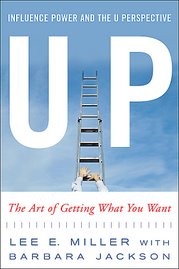
Sunday, November 30, 2008
The holiday season is here, and it's time to start thinking about gifts. Consumers are being careful about how they spend their money this year. Gifts that help with careers are likely to be appreciated. With that in mind, I asked for suggestions on the "must have" career gifts for this season. Here are some of the best ideas I received:
The Long and Shirt of It For the man or woman on the go, Jeff Blee of Glen Ridge, a divisional merchandise manager for Brooks Brothers, recommends the retailer's slim-fitting non-iron shirts. Brooks Brothers offers them in a variety colors and patterns (starting at $79.50 for men and $89.50 for women). In addition to looking crisp, the fact that the shirts don't need ironing will save money on dry cleaning.
Pair the shirt with a stain-resistant tie ($75) and you have the perfect gift to ensure a professional makes the right impression. Blee adds that a classic burgundy tie is a perfect complement for the shirt.
That's a Stretch Nancy Cook, an instructor at the New York Sports Club in Parsippany, suggests yoga classes to improve physical and mental health, essential in today's stressful business climate. Yoga "not only builds strength, stamina and flexibility but also reduces stress, increases energy and improves sleep.
You will likely find that you concentrate better and are better able to cope at work as well, according to Nancy. Yoga classes are free with a membership at the New York Sports Club.
A Sports Club membership starts at $44 per month, or you can purchase a gift certificate for classes at a local yoga center, which will set you back around $80 for five classes.
The Perfect 'Storm' Mark Asnes, chief operating officer of the Wireless Zone, a nationwide chain with stores in Clifton, Hamilton and Madison, calls the new Verizon BlackBerry Storm the businessperson's "must have." Among the features the first touch screen BlackBerry offers is the fastest available broadband, long battery life and a keyboard that automatically switches from a phone keyboard to a computer keyboard simply by turning it on its side. (Cost: $199 with two-year contract.)
Mark suggests purchasing a "tether" for $29, which connects your BlackBerry, iPhone or other PDA to your computer, so you can get wireless internet access on your computer through your PDA. Although a small additional monthly fee is involved -- about $15 per month -- using a tether will allow unlimited downloads and save you fees of $39 or more a month, which normally comes with having a separate wireless internet card for your computer.
You're Speaking My Language Professional development courses are another great gift. With the increase of globalization, a second language can be a great skill. Rosetta Stone offers an interactive computer learning system that helps you learn another language. It connects words and grammar with images and uses speech recognition technology to perfect pronunciation. Prices start at $199 for a six-month online subscription.
Or, use online learning to enhance your computer skills or master new technology through companies such as Makaucorp.com. The company offers online training for computer programs such as Adobe InDesign, Photoshop and Microsoft Excel. Makaucorp.com also offers professional development courses in a variety of topics. (Full disclosure: the company offers some of my courses, including "Interviewing Skills: Landing the Job You Want.) Courses start at $99.
Shelf Life No shopping list would be complete without mentioning some of the best new career books:
Every working professional can benefit from Steve Viscusi's "Bulletproof Your Job: 4 Simple Strategies to Ride Out the Rough Times and Come Out On Top at Work," which offers 50 tactics to bulletproof your job, suggesting ways to stand out as a valuable employee.
"The Confident Leader: How the Most Successful People Go From Effective to Exceptional," by Larine Kane. The book suggests strategies to help professionals make positive decisions that will elevate them to success.
If you or someone you know is looking for a job, buy Richard Bolles' "What Color is Your Parachute 2009: A Practical Manual for Job-Hunters and Career-Changers."
Just In Time Samantha Ettus' book "The Expert's Guide to Doing Things Faster: 100 Ways to Make Life More Efficient," can help you free up more time, to work more or do other things.
Psychic Friends Justine Kenzer, a "professional psychic," suggests a gift certificate for a psychic reading ($100 for 15 minutes by phone or internet). Being able to predict the future: now that would give you a real career advantage.
A veteran human resources executive, Lee E. Miller is a career coach, the author of "UP: Influence Power and the U Perspective -- The Art of Getting What You Want," and the co-founder of YourCareerDoctors.com, a Web site devoted to career success. Mail questions to Lee@YourCareerDoctors.com.




